Hyundai i20 vs Suzuki S-Cross - Differences and prices compared
Costs and Efficiency:
Price and efficiency are often the first things buyers look at. Here it becomes clear which model has the long-term edge – whether at the pump, the plug, or in purchase price.
Hyundai i20 has a distinct advantage in terms of price – it starts at 17400 £, while the Suzuki S-Cross costs 21800 £. That’s a price difference of around 4362 £.
Fuel consumption also shows a difference: Hyundai i20 manages with 5.20 L and is therefore minimal more efficient than the Suzuki S-Cross with 5.30 L. The difference is about 0.10 L per 100 km.
Engine and Performance:
Under the bonnet, it becomes clear which model is tuned for sportiness and which one takes the lead when you hit the accelerator.
When it comes to engine power, the Suzuki S-Cross has a hardly perceptible edge – offering 110 HP compared to 100 HP. That’s roughly 10 HP more horsepower.
In terms of top speed, the Suzuki S-Cross performs hardly perceptible better – reaching 185 km/h, while the Hyundai i20 tops out at 183 km/h. The difference is around 2 km/h.
There’s also a difference in torque: Suzuki S-Cross pulls somewhat stronger with 235 Nm compared to 200 Nm. That’s about 35 Nm difference.
Space and Everyday Use:
Cabin size, boot volume and payload all play a role in everyday practicality. Here, comfort and flexibility make the difference.
Seats: offers more seating capacity – vs .
In curb weight, Hyundai i20 is somewhat lighter – 1088 kg compared to 1280 kg. The difference is around 192 kg.
In terms of boot space, the Suzuki S-Cross offers a bit more room – 430 L compared to 352 L. That’s a difference of about 78 L.
In maximum load capacity, the Suzuki S-Cross performs hardly perceptible better – up to 1230 L, which is about 65 L more than the Hyundai i20.
When it comes to payload, Hyundai i20 to a small extent takes the win – 472 kg compared to 405 kg. That’s a difference of about 67 kg.
Who comes out on top?
Overall, the Suzuki S-Cross shows itself to be slightly ahead and secures the title of DriveDuel Champion.
It convinces with the more balanced overall package and proves to be the more versatile choice for everyday use.
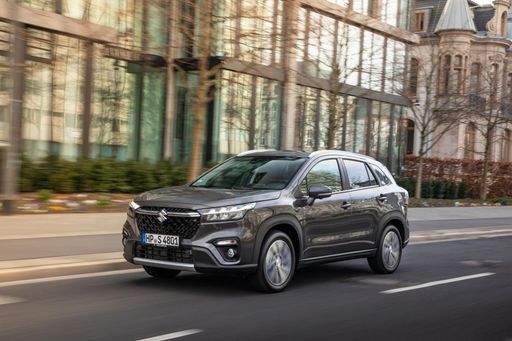 @ Suzuki Motor Corporation
@ Suzuki Motor Corporation
Suzuki S-Cross
Costs and Consumption
View detailed analysis
Engine and Performance
View detailed analysis
Dimensions and Body
View detailed analysis
Hyundai i20
The Hyundai i20 is a cheeky small car that mixes smart styling with sensible practicality, feeling more polished and roomy than you might expect for the money. It’s an easy car to live with, offering engaging handling, a comfy cabin and useful equipment that make daily commutes and weekend errands notably less dull.
details @ Hyundai Motor Company
@ Hyundai Motor Company
 @ Hyundai Motor Company
@ Hyundai Motor Company
 @ Hyundai Motor Company
@ Hyundai Motor Company
 @ Hyundai Motor Company
@ Hyundai Motor Company
 @ Hyundai Motor Company
@ Hyundai Motor Company
Suzuki S-Cross
The Suzuki S-Cross is a neatly packaged crossover that puts everyday practicality ahead of showy theatrics, offering a comfortable cabin and predictable handling that suit family life and weekend errands alike. It’s not a headline-grabber, but its sensible packaging, low-key charm and reputation for reliability make it a shrewd choice for buyers who prefer smart value over flash.
details @ Suzuki Motor Corporation
@ Suzuki Motor Corporation
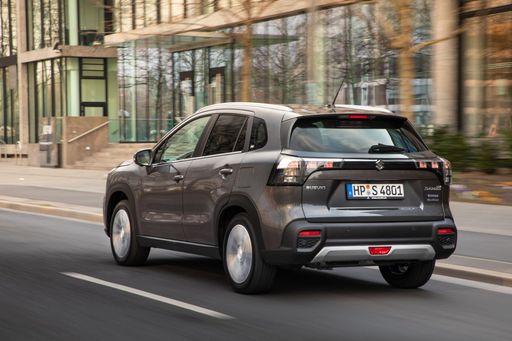 @ Suzuki Motor Corporation
@ Suzuki Motor Corporation
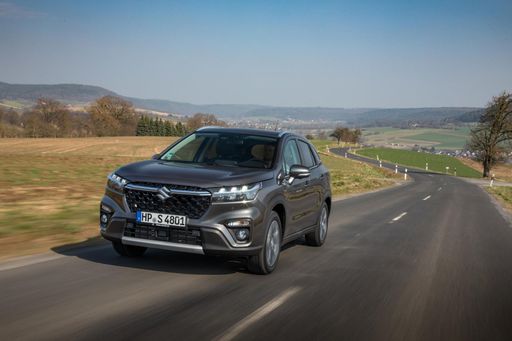 @ Suzuki Motor Corporation
@ Suzuki Motor Corporation
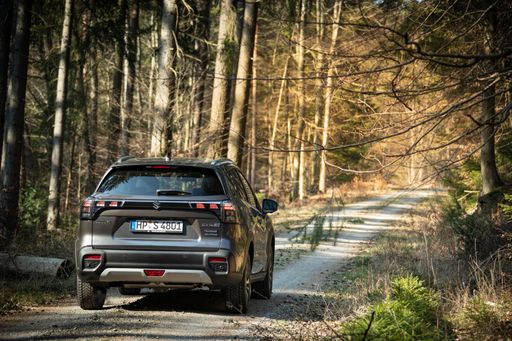 @ Suzuki Motor Corporation
@ Suzuki Motor Corporation
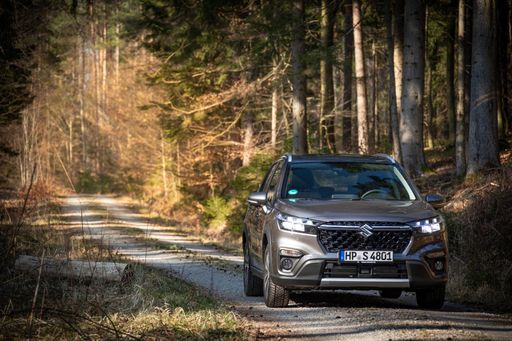 @ Suzuki Motor Corporation
@ Suzuki Motor Corporation
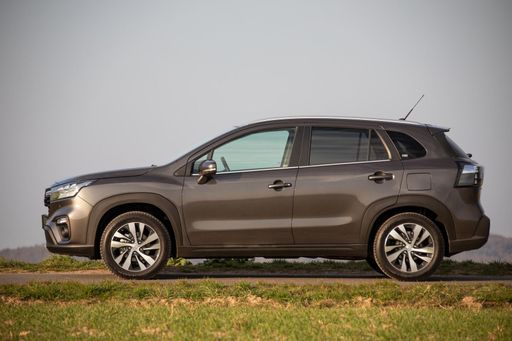 @ Suzuki Motor Corporation
@ Suzuki Motor Corporation
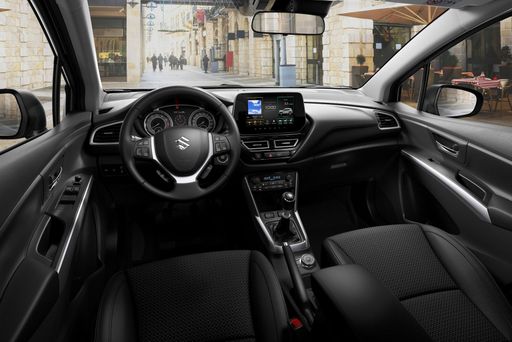 @ Suzuki Motor Corporation
@ Suzuki Motor Corporation
 @ Hyundai Motor Company
@ Hyundai Motor Company
|
 @ Suzuki Motor Corporation
@ Suzuki Motor Corporation
|
|
|
|
Costs and Consumption |
|
|---|---|
|
Price
17400 - 24000 £
|
Price
21800 - 34200 £
|
|
Consumption L/100km
5.2 - 5.3 L
|
Consumption L/100km
5.3 - 5.8 L
|
|
Consumption kWh/100km
-
|
Consumption kWh/100km
-
|
|
Electric Range
-
|
Electric Range
-
|
|
Battery Capacity
-
|
Battery Capacity
-
|
|
co2
119 - 121 g/km
|
co2
119 - 138 g/km
|
|
Fuel tank capacity
40 L
|
Fuel tank capacity
47 L
|
Dimensions and Body |
|
|---|---|
|
Body Type
Hatchback
|
Body Type
SUV
|
|
Seats
5
|
Seats
5
|
|
Doors
5
|
Doors
5
|
|
Curb weight
1088 - 1190 kg
|
Curb weight
1280 - 1385 kg
|
|
Trunk capacity
352 L
|
Trunk capacity
430 L
|
|
Length
4065 - 4075 mm
|
Length
4305 mm
|
|
Width
1775 mm
|
Width
1785 mm
|
|
Height
1450 - 1455 mm
|
Height
1580 mm
|
|
Max trunk capacity
1165 L
|
Max trunk capacity
1230 L
|
|
Payload
450 - 472 kg
|
Payload
395 - 405 kg
|
Engine and Performance |
|
|---|---|
|
Engine Type
Petrol
|
Engine Type
Petrol MHEV
|
|
Transmission
Automatic, Manuel
|
Transmission
Manuel, Automatic
|
|
Transmission Detail
Dual-Clutch Automatic, Manual Gearbox
|
Transmission Detail
Manual Gearbox, Automatic Gearbox
|
|
Drive Type
Front-Wheel Drive
|
Drive Type
Front-Wheel Drive, All-Wheel Drive
|
|
Power HP
79 - 100 HP
|
Power HP
110 HP
|
|
Acceleration 0-100km/h
11.1 - 13.7 s
|
Acceleration 0-100km/h
-
|
|
Max Speed
166 - 183 km/h
|
Max Speed
180 - 185 km/h
|
|
Torque
113 - 200 Nm
|
Torque
235 Nm
|
|
Number of Cylinders
3 - 4
|
Number of Cylinders
4
|
|
Power kW
58 - 74 kW
|
Power kW
81 kW
|
|
Engine capacity
998 - 1197 cm3
|
Engine capacity
1373 cm3
|
General |
|
|---|---|
|
Model Year
2024
|
Model Year
2025
|
|
CO2 Efficiency Class
D
|
CO2 Efficiency Class
D, E
|
|
Brand
Hyundai
|
Brand
Suzuki
|
What drivetrain options does the Hyundai i20 have?
The Hyundai i20 is offered with Front-Wheel Drive.
The prices and data displayed are estimates based on German list prices and may vary by country. This information is not legally binding.
